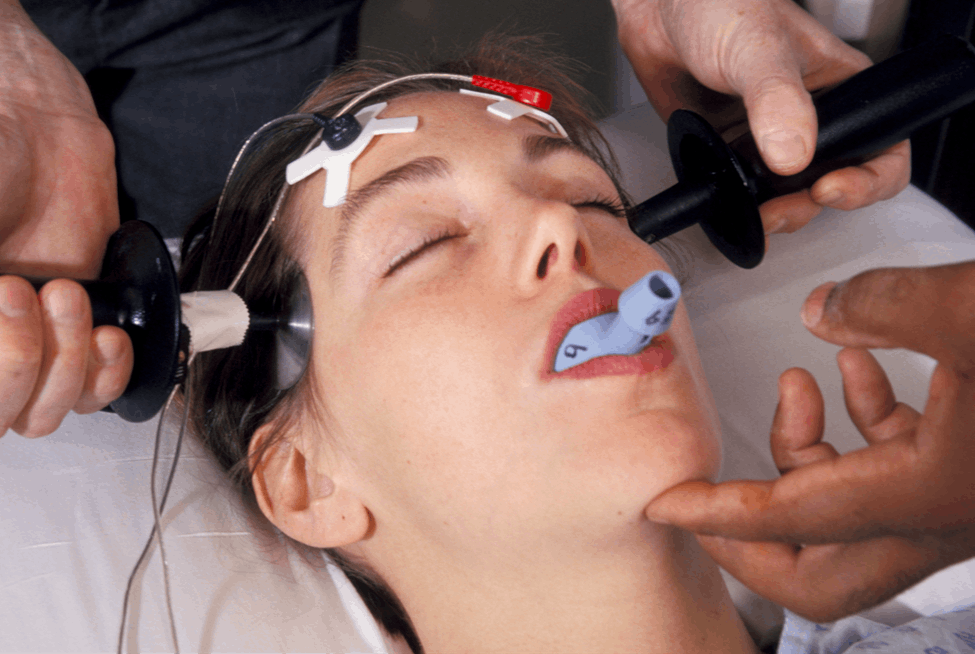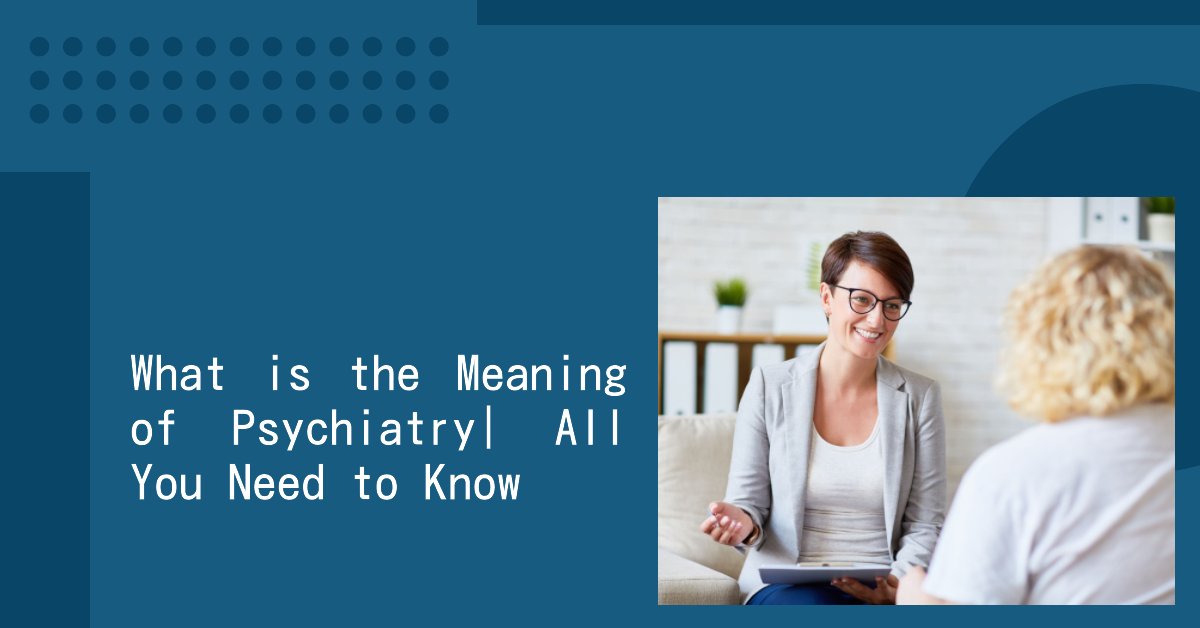Hey there! Have you ever wondered what psychiatry is all about? It’s a super important field that helps us take care of our mental health. Just like we go to doctors when our bodies aren’t feeling well, psychiatry is all about taking care of our minds and emotions.
So, let’s dive in and learn everything you need to know about psychiatry and why it matters.
What is the Meaning of Psychiatry?

Imagine your brain as the supercomputer that runs everything in your body. It controls your thoughts, feelings, and actions. But sometimes, just like any computer, it can face glitches and issues. That’s where psychiatry comes in! It’s like a special doctor for our brains and emotions. Psychiatrists study how our thoughts, feelings, and behaviors affect our well-being and how to make them better.
Back in ancient times, people thought that mental health issues were caused by evil spirits or bad luck. But as time went on, curious minds started to look deeper into the human brain.
During the 18th and 19th centuries, significant progress was made in understanding mental health. Pioneers in psychiatry, like Philippe Pinel and Dorothea Dix, advocated for the humane treatment of individuals with mental illnesses and pushed for establishing mental health hospitals that focused on therapy and care rather than confinement and punishment.
In the 20th century, modern psychiatry emerged as a distinct medical specialty. Breakthroughs in neuroscience and psychology led to a deeper understanding of the human mind and brain. The developments by Sigmund Freud and the introduction of psychotropic medications revolutionized mental health treatment approaches.
Today, psychiatry continues to evolve with advancements in medical research and technology.
The Role of a Psychiatrist

A psychiatrist is a type of doctor who helps people with mental health issues. To become a psychiatrist, they need to go to medical school, just like doctors who treat physical problems. After medical school, they do more training in mental health, called psychiatry residency. This training helps them understand how the brain works and how to help people with different mental health conditions.
Psychiatrists can specialize in various areas of mental health. Some focus on treating children and teenagers, helping them with problems like anxiety or depression. Others specialize in working with adults and may help with issues like bipolar disorder or schizophrenia. Some psychiatrists also have expertise in treating older adults, dealing with problems like memory loss or dementia. They can also specialize in addiction psychiatry to help people struggling with drug or alcohol issues.
Psychiatrist vs. Psychologist: What is the Difference?
Psychiatrists and psychologists both help people with mental health problems, but they have different roles. Psychiatrists are medical doctors, so they can prescribe medications to treat mental health conditions. They use their medical knowledge to understand how the body and brain work together. On the other hand, psychologists are not medical doctors; they have a Ph.D. or Psy.D.
They use talk therapy and other techniques to help people cope with their emotions and thoughts. While both are essential in mental health care, psychiatrists can provide medication as part of their treatment, while psychologists focus on therapy without using medications.
Common Mental Health Disorders

Depression
Depression is a mental health condition that makes a person feel very sad and hopeless. They might lose interest in things they used to enjoy and have trouble sleeping or eating. Some people may even have thoughts of hurting themselves. But with help from professionals and support from loved ones, many people with depression can get better and lead fulfilling lives.
Anxiety Disorders
Anxiety disorders are when someone feels very worried or afraid all the time. They may have constant nervousness and fears that can be hard to control. This can make it challenging to do everyday things or be around other people. Luckily, there are treatments like therapy and sometimes medication that can help manage anxiety and reduce its impact on someone’s life.
Bipolar Disorder
Bipolar disorder affects a person’s mood, making them go through extreme highs and lows. During the high phase, they may feel overly energetic and happy, but during the low phase, they may feel very sad and hopeless. It can be challenging to manage these mood swings, but with proper treatment, people with bipolar disorder can lead stable lives.
Schizophrenia
Schizophrenia is a complex mental illness that can cause a person to have trouble thinking clearly and managing their emotions. They might hear or see things that others don’t, which can be very frightening. Treatment for schizophrenia usually involves medication and therapy to help people cope with their symptoms and improve their quality of life.
Obsessive-Compulsive Disorder (OCD)
OCD is a condition where a person has repetitive thoughts and feels compelled to do certain actions over and over again. These thoughts and actions can take up a lot of time and may interfere with daily life. Therapy, especially a type called cognitive-behavioral therapy, can be helpful in managing OCD symptoms.
Post-Traumatic Stress Disorder (PTSD)
PTSD can happen after a person goes through a very upsetting or scary event, like a car accident, natural disaster, or violence. They might have nightmares, feel on edge, or avoid things that remind them of the traumatic experience. Treatment, such as therapy and support groups, can assist in the healing process and help people with PTSD find ways to cope with their feelings.
Attention-Deficit/Hyperactivity Disorder (ADHD)
ADHD is a condition that makes it hard for someone to pay attention and sit still. They might be very fidgety and have trouble focusing on tasks or following instructions. Children with ADHD can sometimes struggle in school, but with proper support and sometimes medication, they can improve their attention and behavior.
The Psychiatry Treatment Process

When you’re feeling down, anxious, or not like yourself, talking to someone who can help is essential. That’s where psychiatrists come in! They are like mental health detectives who try to understand what’s going on in your mind. They will ask you questions about how you’re feeling, your thoughts, and your behaviors. This helps them figure out what might be causing the issues you’re experiencing.
Treatment Options
Once the psychiatrist understands your situation, they’ll talk to you about different treatment options. These treatments are like tools they use to help you feel better. Let’s explore some of these options:
Psychotherapy
Psychotherapy, also known as talk therapy, is a bit like having a friendly chat with someone who knows how to help. It’s a safe space to talk about your thoughts and feelings. The therapist can give you guidance, teach you coping skills, and help you understand yourself better. It’s all about finding ways to feel happier and more in control of your emotions.
Medication
Sometimes, psychiatrists may suggest medication to help balance the chemicals in your brain. These chemicals can affect how you feel and behave. The medication is like giving your brain a little extra help to feel more stable and less overwhelmed. It’s essential to take the medication exactly as prescribed and talk to your doctor if you have any concerns.
Electroconvulsive Therapy (ECT)
ECT might sound a bit scary, but it’s a safe and effective treatment for certain conditions. It’s usually reserved for severe cases where other treatments haven’t worked. During ECT, you’re given a tiny electric shock that helps your brain reset itself. It might sound strange, but many people find it really helpful in improving their mental health.
Transcranial Magnetic Stimulation (TMS)
TMS is another type of treatment that’s like a gentle brain massage. A machine sends magnetic pulses to your brain, which can help regulate mood and reduce symptoms. It’s non-invasive, which means there’s no need for surgery or anything like that.
Holistic Approaches to Mental Health
In addition to traditional treatments, some psychiatrists may suggest holistic approaches to mental health. These are activities and lifestyle changes that can boost your overall well-being. For example, regular exercise, eating healthy foods, getting enough sleep, and practicing mindfulness or meditation can all greatly improve your mental health.
Conclusion
In conclusion, learning the meaning of psychiatry has shown us the important role it plays in helping people with mental health problems. Psychiatry isn’t just about treating these issues but also about understanding how our minds work and how we behave.
As we keep learning and improving in psychiatry, using research and technology, we can help even more people effectively. Understanding psychiatry enriches our knowledge and teaches us to be more caring and understanding toward others facing mental health challenges.


